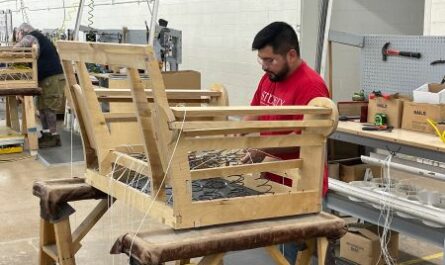Therapedic International’s CEO weighs in on the arguments and the wrinkle called COVID
By Gerry Borreggine
PRINCETON, N.J. — There are two distinct sides arguing their point in the Department of Commerce antidumping debate going on now in the United States.


Gerry Borreggine
On one side there are the U.S. bedding manufacturers, of which some claim to have been operating at about 50% capacity, pre-COVID. On the other side are the importers, most based in the U.S., who are arguing the duties will not only harm their importing businesses but also will have an adverse effect on the American consumer.
The COVID-19 pandemic has even further muddied the waters to determine who is right, and what is fair. COVID has thoroughly disrupted the home furnishings supply chain. In a mattress industry that is enjoying the first real effect of the often-referenced “pent-up demand,” most manufacturers are having difficulty fulfilling the orders they have in-house because they cannot get sufficient raw materials to manufacture their goods.
The importers, who originally claimed the imports were necessary to supply the market needs of the U.S., are saying, “We told you so…”
The recent DOC dumping margins range from as little as 2.61% for Indonesia to a whopping 989.9% for Vietnam. If these dumping margins hold, they will essentially wipe out mattress imports from Vietnam, which, at recent count, is the largest importer of mattresses to the U.S. The duties will take Vietnam out of the supply system and represent the biggest U.S attack on that country since the Haiphong bombings during the Vietnam War.
/*INSERT REDIRECT INTO gi_redir VARIABLE*/
var gi_protocol = document.location.protocol;
var gi_redir = “”;
var gi_dasrc = gi_protocol + “//display.hcgmedia.com/?dsid=593202011517130287&pid=329&skid=10&if=0&at=0&alid=728_90&adtype=0&exty=1&special=0&redir=” + gi_redir + “&r=” + Math.random();
document.write(“”);
var gi_protocol = document.location.protocol;
var gi_redir = “”;
var gi_dasrc = gi_protocol + “//display.hcgmedia.com/?dsid=57420208119551504&pid=329&skid=76&if=0&at=0&alid=728_90&adtype=3&exty=1&special=0&redir=” + gi_redir + “&r=” + Math.random();
document.write(“”);
Is there a right or wrong side in this matter?
As it is in most issues, the truth lies somewhere between the battle lines that have been drawn by each side.
On a typical month or week, U.S. bedding manufactures have the capacity and material to fill more business than they have in-house. If you came to a typical manufacturer with a $100,000.00 order, they would pounce on it — as soon as they wiped the slobber away from their mouth — and deliver the goods within the prescribed delivery date.
But that was pre-COVID. Now, these same manufacturers are telling prospects they can’t take their orders because they need to service their current dealers, who are awaiting deliveries of ordered goods. It’s unprecedented, as it’s never before happened in the mattress industry.
The importers, of which some have interestingly banded together under the moniker American Mattress Alliance, claim the DOC’s duties are driven by U.S. corporations to gain greater market share.
What’s the solution?
One answer could be for the better-capitalized importers to open U.S. manufacturing operations, as some have, and are currently doing. Granted, there will be a transition period for these companies, but candidly, most of them had to see this coming hot-on-the-heels of the China duties imposed in 2019.
Another outshoot of this issue could be the obsolescence of the $199 imported queen set. These products are doing no one any good. Despite paying so little, the consumer is the one who ends up paying the most — for an inferior product that will not deliver on almost any expectation. Having these products in our system gives the entire industry a black eye. If nothing else comes from the duties other than to eliminate these products from the marketplace, the duties will represent a victory for the American consumer.
Does all this mean there is no place for the better run and operated importers? No. Perhaps they can petition DOC to attach a duty threshold. Maybe goods that retail over a certain threshold, say $999, are not subject to the duties, or if they are, they are imposed at a much lower rate.
The world has become a smaller place, and the economy has become a global one. We need to figure this out in a way that will benefit retailers and help them serve their customers, the consumer, in an optimal way.
Gerry Borreggine is President/CEO of Princeton, N.J.-based Therapedic International, which has a network of 10 U.S licensees; 20 international licensees, including several that are located in the duty-affected countries; and 15 specialty licensees who make top-of-bed items under the Therapedic brand. He’s a member of the International Sleep Products Assn. and has served as chairman of both ISPA’s board and its Better Sleep Council.
var gi_protocol = document.location.protocol;
var gi_redir = “”;
var gi_dasrc = gi_protocol + “//display.hcgmedia.com/?dsid=578202081881555635&pid=329&skid=76&if=0&at=0&alid=728_90&adtype=3&exty=1&special=0&redir=” + gi_redir + “&r=” + Math.random();
document.write(“”);
var gi_protocol = document.location.protocol;
var gi_redir = “”;
var gi_dasrc = gi_protocol + “//display.hcgmedia.com/?dsid=582202091474319419&pid=329&skid=76&if=0&at=0&alid=728_90&adtype=3&exty=0&special=0&redir=” + gi_redir + “&r=” + Math.random();
document.write(“”);
var gi_protocol = document.location.protocol;
var gi_redir = “”;
var gi_dasrc = gi_protocol + “//display.hcgmedia.com/?dsid=5892020108184154614&pid=329&skid=76&if=0&at=0&alid=728_90&adtype=3&exty=1&special=0&redir=” + gi_redir + “&r=” + Math.random();
document.write(“”);
var gi_protocol = document.location.protocol;
var gi_redir = “”;
var gi_dasrc = gi_protocol + “//display.hcgmedia.com/?dsid=566202081191214486&pid=329&skid=76&if=0&at=0&alid=728_90&adtype=3&exty=1&special=0&redir=” + gi_redir + “&r=” + Math.random();
document.write(“”);





